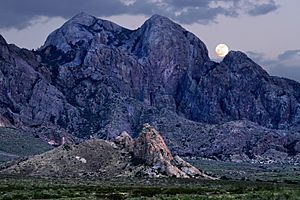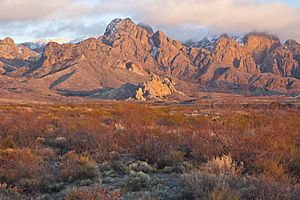Organ Mountains–Desert Peaks National Monument facts for kids
Quick facts for kids Organ Mountains–Desert Peaks National Monument |
|
|---|---|
| Lua error in Module:Location_map at line 420: attempt to index field 'wikibase' (a nil value). | |
| Location | Doña Ana County, New Mexico, United States |
| Nearest city | Las Cruces, NM |
| Area | 496,330 acres (200,860 ha) |
| Established | May 21, 2014 |
| Governing body | Bureau of Land Management |
| Website | Organ Mountains–Desert Peaks National Monument |
The Organ Mountains–Desert Peaks National Monument is a special protected area in New Mexico, United States. It's like a huge outdoor museum managed by the Bureau of Land Management. This monument helps protect amazing natural and historical treasures for everyone to enjoy.
Contents
Discover the Organ Mountains–Desert Peaks National Monument
This monument covers a massive 496,330 acres (200,860 ha) of land. It's located in southern New Mexico, near the city of Las Cruces. The area includes several mountain ranges that are part of the Chihuahuan Desert. These ranges are the Robledo Mountains, Sierra de las Uvas, Doña Ana Mountains, Organ Mountains, and Potrillo Mountains.
The monument protects many important things. These include cool rock formations (geological), ancient plant and animal remains (paleontological), and sites from past human cultures (archaeological). On May 21, 2014, President Barack Obama officially made this area a national monument. About half of the monument is set aside as "wilderness." This means it's kept very natural, with no buildings or motorized vehicles allowed.
Exploring History and Nature
The Organ Mountains–Desert Peaks National Monument is full of interesting historical and cultural spots. Before 1853, this land was actually the border between Mexico and the United States.
Ancient Discoveries
This area has over 240 known archaeological sites. These sites show where some of the earliest Native American groups lived. You can also find ancient petroglyphs, which are drawings carved into rocks by three different tribes. The monument also includes Shelter Cave and Conkling Cavern, where scientists have found fossils of giant ground sloths!
Famous Figures and Trails
More recently, this land was home to famous historical figures. Billy the Kid, a well-known outlaw, and Geronimo, a brave Apache leader, both spent time in New Mexico in the 1800s. People say Billy the Kid visited a spot called "Outlaw Rock," and there's a cave known as "Geronimo's Rock." The monument also protects 22 miles (35 km) of the historic Butterfield Stagecoach Trail, which was a route for mail and passengers in the old West.
Training for Space
Believe it or not, this monument also has ties to space exploration! During World War II, bomber pilots practiced their targeting skills here. Later, in the 1960s, American astronauts trained for their lunar missions at Kilbourne Hole. This is a volcanic crater within the Potrillo volcanic field that looks a bit like the moon's surface.
How the Monument Was Created
It took several years of effort to make this area a national monument. Many people who care about protecting nature worked hard to make it happen. Several ideas were presented to Congress to protect the land, but they faced some challenges.
Unlike some other monument designations, the local communities and government in Doña Ana County strongly supported the idea. A survey showed that 60 percent of local voters wanted this land to become a 500,000-acre national monument. Their support helped make it a reality!
 | James Van Der Zee |
 | Alma Thomas |
 | Ellis Wilson |
 | Margaret Taylor-Burroughs |



